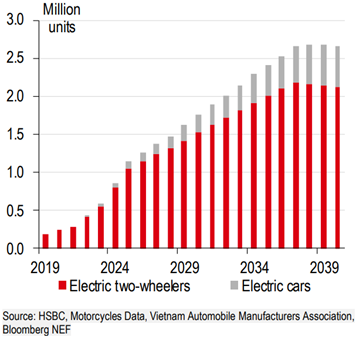HCMC – Vietnam will need an estimated US$12.3 billion by 2040 to develop its electric vehicle (EV) infrastructure to keep up with a projected 2.5-fold increase in EV sales over the next decade, HSBC said in a recent report.
As the leading market for electric motorcycles in Southeast Asia and the second-largest globally, only behind China, Vietnam is at a pivotal transition point towards electric cars. The report notes that although electric motorcycle sales are thriving, they are expected to reach a saturation point by the late 2030s.
The country is benefiting from global shifts towards energy transition and carbon emission reductions. Local EV manufacturers have significantly contributed to the green transformation of the scooter market. However, as this segment nears saturation, attention is shifting towards electric cars.
Annual sales of electric motorcycles and cars in Vietnam could rise from under one million in 2024 to over 2.5 million by 2036. The Vietnam Automobile Manufacturers Association forecast that by 2040, there could be 3.5 million electric cars on Vietnamese roads.
Despite these optimistic projections, several consumer concerns persist, such as pricing, range anxiety, and charging infrastructure, which are significant barriers to wider EV adoption.
In response, Southeast Asian nations, including Vietnam, are rolling out supportive measures. For instance, Vietnam has introduced incentives like waiving registration fees for EVs, reducing import taxes on these vehicles, and exempting corporate income tax for EV investment projects.
Additionally, the Ministry of Transport has suggested a US$1,000 subsidy for each EV buyer, although this proposal has encountered resistance from the Ministry of Finance.
To support the expected rise in EV usage, HSBC estimated that Vietnam will require significant investment in charging infrastructure and renewable energy, needing about 14 terawatt-hours of energy from 2024 to 2040.
“Overcoming common barriers to EVs in Vietnam lies in infrastructure investment, which is also a challenge for the country’s energy transition,” HSBC said in its report.











